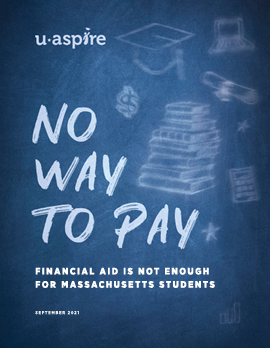Massachusetts is home to more than 100 colleges and universities, yet for too many of its residents attaining a bachelor’s degree at these institutions is financially out of reach. Without sufficient financial aid, students are expected to cover substantial bills and finance higher education with debt. This financial burden falls most heavily on students of color and students from low-income backgrounds who face affordability gaps statewide.
No Way to Pay: Financial Aid Is Not Enough for Massachusetts Students aims to present the reality of college affordability in the state through the financial aid offers that uAspire advisors reviewed with students. uAspire analyzed 2,253 aid offers from 61 four-year public and private Massachusetts colleges and universities sent to 1,111 Greater Boston high school seniors with expected family contributions (EFC) of zero.
Using primary and secondary research, the report examines how financial aid has not kept pace with college costs, how students struggle to cover the gap, and how the decline of the state’s investment in higher education and financial aid leaves Massachusetts trailing other states. No Way to Pay offers policy recommendations for critically needed resources and systems-level solutions to build a more equitable higher education system and create viable pathways to economic opportunity.
